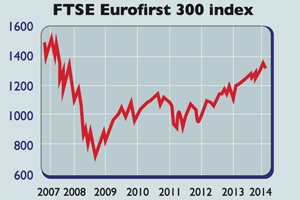Can Europe keep going?
Europe's disappointing recovery should pave the way for central-bank money printing.

Get the latest financial news, insights and expert analysis from our award-winning MoneyWeek team, to help you understand what really matters when it comes to your finances.
You are now subscribed
Your newsletter sign-up was successful
Want to add more newsletters?

Twice daily
MoneyWeek
Get the latest financial news, insights and expert analysis from our award-winning MoneyWeek team, to help you understand what really matters when it comes to your finances.

Four times a week
Look After My Bills
Sign up to our free money-saving newsletter, filled with the latest news and expert advice to help you find the best tips and deals for managing your bills. Start saving today!
Europe's rebound is "pathetic", says Hugo Dixon on Reuters.com. Growth is set to reach just 1% this year. There are bright spots, such as "a moderate recovery" in Spain, now enjoying the fruits of a "root-and-branch overhaul of its labour market and banking system". But France, slow to embrace reforms, is falling behind.
And a key business confidence indicator in Germany, which accounts for around 30% of eurozone GDP, has now slipped for three months in a row.
So it's just as well that listed eurozone firms make plenty of money outside Europe. In Germany's Dax index, for instance, the 30 constituents make over 70% of their sales abroad. Similarly, France's CAC-40 is dominated by blue-chips with an international footprint.
MoneyWeek
Subscribe to MoneyWeek today and get your first six magazine issues absolutely FREE

Sign up to Money Morning
Don't miss the latest investment and personal finances news, market analysis, plus money-saving tips with our free twice-daily newsletter
Don't miss the latest investment and personal finances news, market analysis, plus money-saving tips with our free twice-daily newsletter
Europe remains the key export market for most listed eurozone firms, but emerging markets are catching up quickly. Along with the very gradual recovery on the continent, this helps explain why the earnings outlook has improved.
Morgan Stanley notes that the results seen so far for the second quarter show that companies have "finally returned to positive earnings growth", after three years of steady declines.
There's another reason for improved profits: the softening euro, which makes exports cheaper. It has only declined marginally against the dollar in recent weeks, but could well now be "entering the early stages of a broad-based sustained move lower", reckons Morgan Stanley.

So fundamentals have improved of late but even if they take another turn for the worse, there is still reason to be bullish. Europe is in danger of slipping into deflation, which will increase its debt burden even further.
European banks are sitting on major losses and are reluctant to lend. So it looks as though the European Central Bank will have to print money before too long, which always lights a fire under stocks and weakens currencies.
Valuations are no longer especially cheap, but equities are certainly more appealing than bonds. As Bank of America Merrill Lynch points out, eurozone blue chips are yielding more than Portuguese government debt. Europe's rally has further to go.
Get the latest financial news, insights and expert analysis from our award-winning MoneyWeek team, to help you understand what really matters when it comes to your finances.

-
 Average UK house price reaches £300,000 for first time, Halifax says
Average UK house price reaches £300,000 for first time, Halifax saysWhile the average house price has topped £300k, regional disparities still remain, Halifax finds.
-
 Barings Emerging Europe trust bounces back from Russia woes
Barings Emerging Europe trust bounces back from Russia woesBarings Emerging Europe trust has added the Middle East and Africa to its mandate, delivering a strong recovery, says Max King